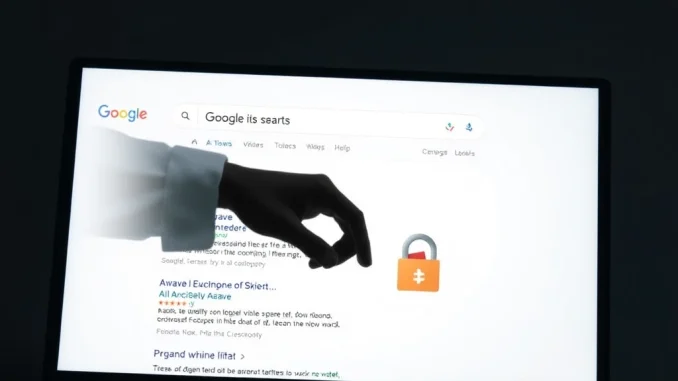
An urgent warning has been issued concerning fake advertisements for the popular DeFi protocol Aave appearing prominently in Google search results. These malicious ads are designed to trick unsuspecting users and pose a significant threat of a devastating wallet drain.
Understanding the Google Ads Crypto Threat
Scammers are constantly finding new ways to exploit users in the digital asset space. One increasingly common tactic involves leveraging high-visibility platforms like Google Search. By purchasing ad space for popular crypto-related terms, they can push their fraudulent links to the very top of search results, where users are likely to click.
The latest alert, shared by Web3 security firm Scam Sniffer on X, highlights fake ads targeting users searching for “Aave”. These ads look convincing at first glance, mimicking official branding, but they lead to dangerous destinations.
The Mechanism of Crypto Phishing
Clicking on one of these fake Google ads redirects users not to the legitimate Aave website, but to a sophisticated phishing site. These fraudulent websites are often near-perfect replicas of the real Aave platform.
The goal is classic crypto phishing. The fake site prompts users to connect their cryptocurrency wallets, just like the real Aave site would. However, once connected, instead of performing the expected DeFi actions (like lending or borrowing), the site attempts to trick the user into signing a malicious transaction.
These malicious transactions are carefully crafted to grant the scammer permission to drain the user’s wallet of specific assets, or even all approved tokens. This is how the Aave scam leads directly to a wallet drain.
Why Web3 Security is Crucial Now
The rise of sophisticated scams underscores the critical importance of robust Web3 security practices. Unlike traditional finance where institutions might reverse fraudulent transactions, actions on the blockchain are often irreversible.
Scam Sniffer and similar security solutions play a vital role in identifying and alerting the community to these threats. However, ultimate security rests with the individual user.
Actionable Steps to Protect Crypto Wallet
How can you avoid falling victim to this specific Google ads crypto scam and similar threats? Protecting your digital assets requires vigilance and following basic security principles:
- Verify URLs: ALWAYS double-check the website address in your browser’s URL bar. Ensure it is the official, correct domain for Aave (or any protocol you are using). Scammers often use similar-looking domains (typosquatting).
- Use Official Sources: Bookmark the official Aave website (and other protocols you use) and access it directly from your bookmarks, rather than relying on search results, especially paid ads.
- Be Skeptical of Ads: Treat sponsored results in search engines with extreme caution, especially in the crypto space.
- Understand Transaction Requests: When your wallet prompts you to sign a transaction, carefully review what permissions you are granting. Are you approving spending limits? Transferring tokens? If it looks suspicious or doesn’t match the action you intended, do not sign it.
- Consider Hardware Wallets: For storing significant amounts of crypto, a hardware wallet adds an extra layer of security by requiring physical confirmation for transactions.
- Stay Informed: Follow reputable security firms like Scam Sniffer and official protocol channels for warnings about ongoing threats.
Taking these steps is essential to protect crypto wallet contents from phishing attempts.
Conclusion
The warning about fake Aave ads on Google is a stark reminder of the persistent threats in the crypto landscape. Scammers are actively targeting users through common interfaces like search engines. By understanding their tactics, practicing careful Web3 security, and always verifying where you are connecting your wallet, you can significantly reduce your risk and protect your valuable assets from a devastating wallet drain caused by crypto phishing. Stay safe out there!



